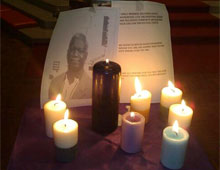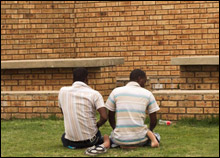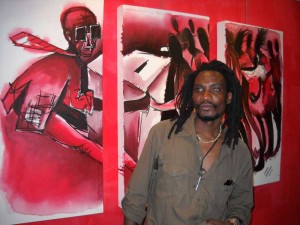
Owen Maseko
Anyone who cares about the freedom of artistic expression, or about the chances of any healing in Zimbabwe any time soon, must surely condemn in the strongest terms the arrest of Owen Maseko in Bulawayo on Friday last week. Owen is one of Zimbabwe’s most outstanding young artists – his paintings hang on walls all over the world – and he, like all Zimbabweans and all artists everywhere, has a right to explore and express any aspect of his world.
Owen launched a very courageous exhibition of art on Thursday last week on the theme of Gukurahundi, featuring installations, large paintings, and paintings and graffiti done directly on to the walls. Why is it, that 27 years after army troops began their massacres in Matabeleland and the Midlands, this issue is still so sensitive that people affected cannot dare to speak out? To heal, people MUST be allowed to process their pain, so that they can move on. Victims need understanding and space to be heard, not to be locked into jail cells for daring to show the wounds of the nation.
Owen Maseko is now on bail of USD100 and he has to report to the police station every Friday. Click here to view photos of some of Owen’s art in our gallery.
Tue, March 30 2010 » Zimbabwe Update » 3 Comments
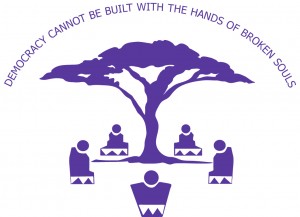 Solidarity Peace Trust will be launching two new reports on 31 March 2010. You are invited to attend the launch:
Solidarity Peace Trust will be launching two new reports on 31 March 2010. You are invited to attend the launch:
Date: 31 March 2010
Time: 11am
Where: Devonshire Hotel, Corner Melle and Jorissen Streets, Braamfontein, Johannesburg
“What options for Zimbabwe”? A Briefing on the current political and economic challenges of the GPA and the political options available in moving the situation forward
and, “Desperate lives, twilight worlds – how a million Zimbabweans live without sanction or sanctuary in South Africa”
Seven years after the largest mass movement of people into South Africa began, the government remains without a coherent response to the crisis. Research indicates that more than one million Zimbabweans now reside in South Africa, with 600,000 in Johannesburg. (Read more…)
Mon, March 29 2010 » Press Releases » Leave a comment
From its inception the MDC was characterised by a commitment to liberal political and economic values. Formed in the aftermath of the fall of ‘existing socialist’ states in Eastern Europe in 1989/90, the MDC was part of the ‘second wave’ of democratic struggles that broke out in African post colonial states in the 1990’s against authoritarian regimes. Developed out of the struggles for constitutionalism, labour rights and democratisation, the language of the MDC eagerly sought to differentiate itself from the exclusive and authoritarian assertions of Zanu PF’s nationalism.
The Politics of the MDC
Born out of a broad array of civic struggles a central part of the MDC was its location in civil society and its fight for a politics of human and civic rights, and a broad, racial and ethnic inclusiveness. Confronted with the violent and selective nationalism of the ruling party that continuously excluded different sections of the populations from ‘belonging’ to the nation, the MDC projected itself as a party of tolerance, peaceful constitutional struggles and broad democratic values. In bringing together a broad alliance of forces to confront the Mugabe, including support from the Western countries, the liberal social democratic message of the MDC was quickly cast as a foreign creation of ‘imperialism’ and the party labeled ‘puppets’ of the West. (Read more…)
Wed, March 17 2010 » Global Political Agreement, History » Leave a comment
Solidarity Peace Trust has produced a number of flyers about the constitution. We invite members of the public and other organisations to download and distribute these. The flyers can be found in PDF format on our current topics page. Alternatively, use the list below to browse directly to specific flyer topics.
Please note that the flyers have been designed for print in A5 format. Print the flyers in A4 with the second page on the back of the first, then cut in half to form two A5 flyers.
We invite you to discuss the flyer topics using the comments feature for each post.
Thu, February 25 2010 » Constitution, Zimbabwe Update » Leave a comment
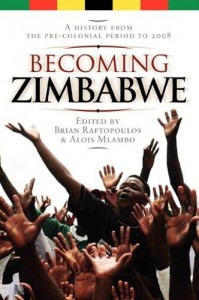
Becoming Zimbabwe. A History from the Pre-colonial Period to 2008
Professor Brian Raftopoulos recently discussed Becoming Zimbabwe, a book he co-edited with Alois Mlambo, in an interview with Chris Kabwato. Brian Raftopoulos is Director of Research and Advocacy at the Solidarity Peace Trust.
Chris Kabwato (CK): You dedicate your book to “the continuing process of ‘Becoming Zimbabwe’”. Thirty years after independence what is that process and what does it entail?
Professor Brian Raftopoulos (BR): This refers to the complex process of nation-building drawing on the different threads of Zimbabwean history, in the context of changing national, regional and international dynamics. The book also places, as one of its central concerns, the importance of challenging the notion that one political party or dominant section of Zimbabwean society has the right to dictate the terms for understanding and narrating the past, to the exclusion of broader social groupings in the society. The authors were thus concerned with pluralizing the understanding of the past and its multiple effects on the politics of the present. (Read more…)
Tue, February 23 2010 » History, Interviews » Leave a comment



